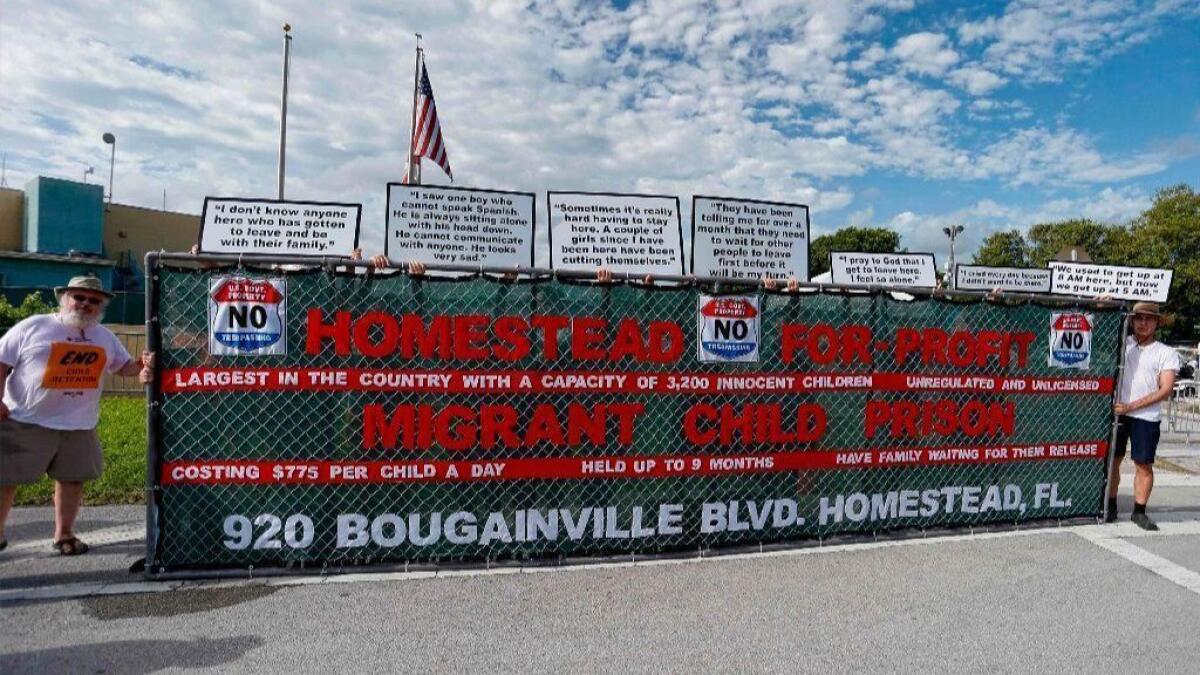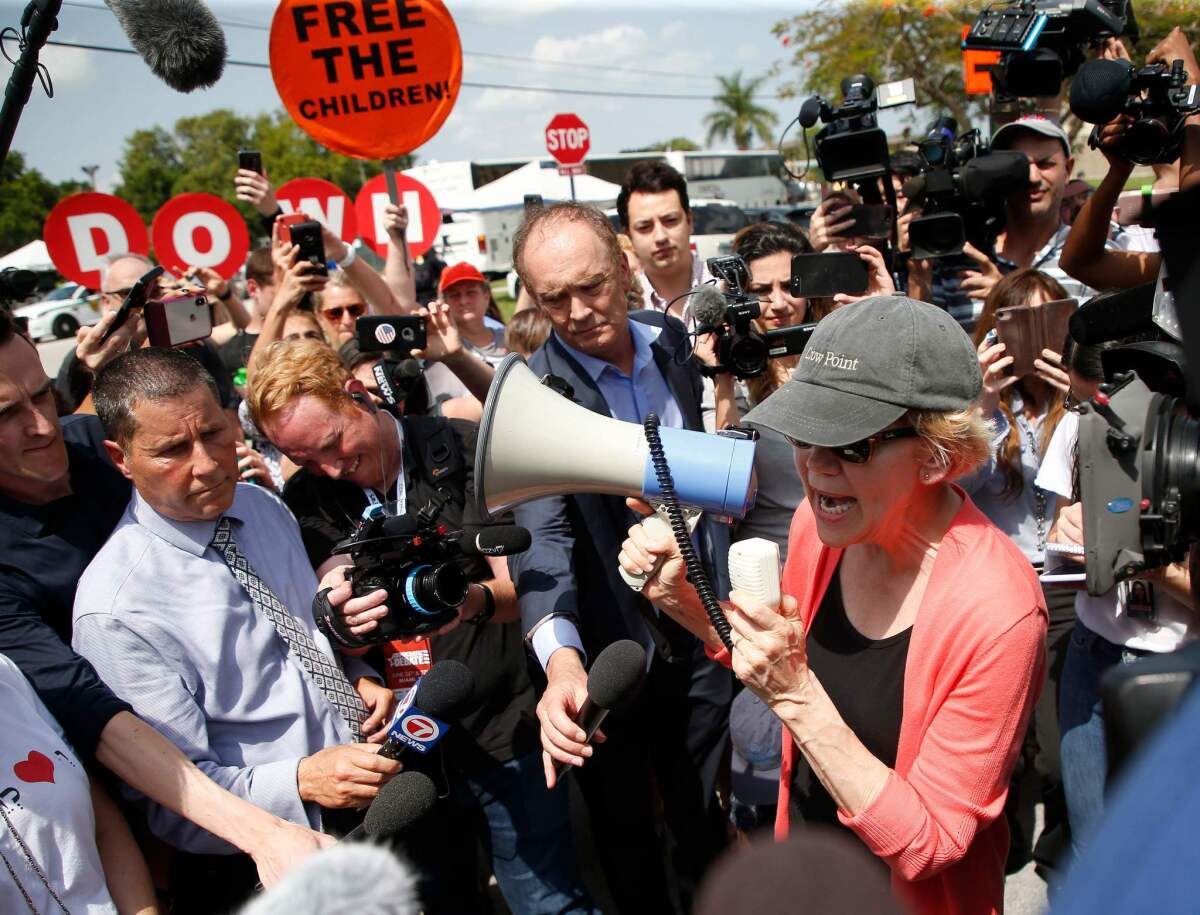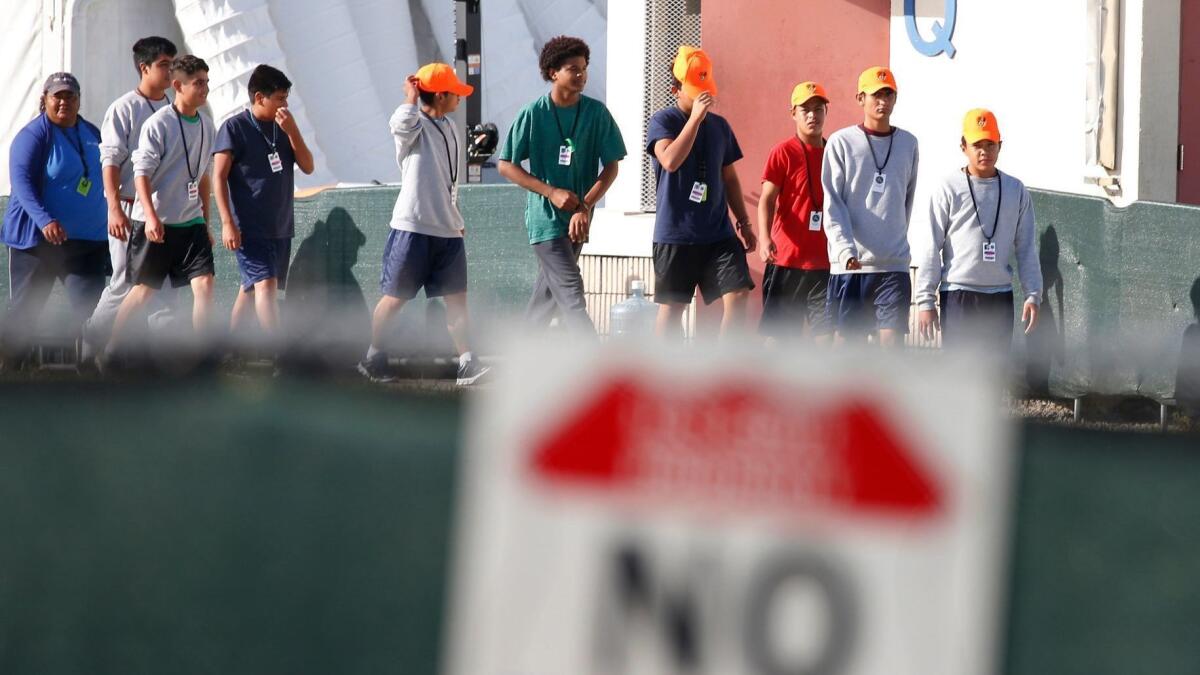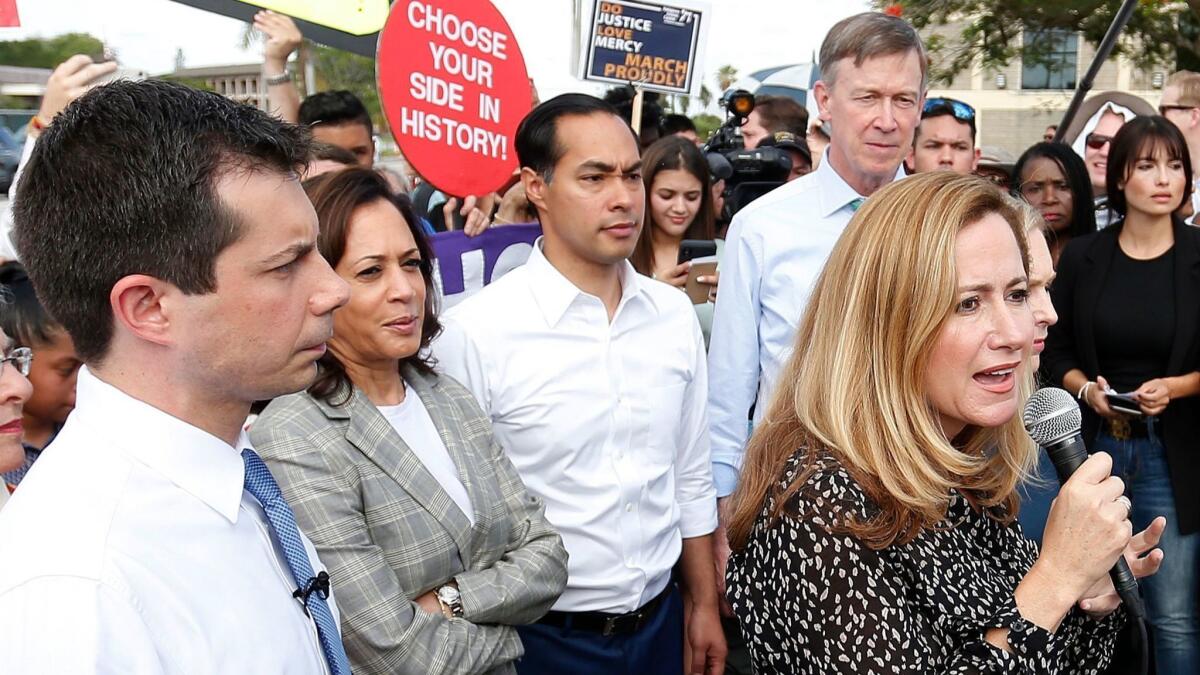A Florida detention center for migrant youths became an essential stop for Democratic candidates

Reporting from Homestead, Fla. — There were a lot of lonely days over the last year for Frank Morra, who parks himself for hours on end on a bleak, baking patch of ground across from a prison-like compound.
“We’ve been here every Wednesday,” said Morra, 61, coming to bear witness and try to call attention to the privately run facility where thousands of migrant children are being held.
It was a high calling, but not a particularly popular one — until the Democratic candidates came to debate in nearby Miami, hungry for a coherent and broadly palatable message on immigration.
The Homestead detention center provided it.
“You and I paid for this place. What is being done in that building is being done in our name and with our money,” Mayor Pete Buttigieg of South Bend, Ind., said Friday, one of five candidates who visited the protest site that day. “It is wrong. It is wrong, but if it is our tax money, if it’s our country, then it’s our obligation to bring about something different — and that’s what we’re here to do.”
The complex is a symbol of some of President Trump’s harsher immigration policies that have been eyed warily by voters. It offers a rallying point against Trump without wading into a fraught conversation within the Democratic Party about their alternative vision for immigration and border security.
A trickle of candidate visits that started with Bay Area Rep. Eric Swalwell soon became a flood, with at least 10 of the 2020 hopefuls making the trek about 35 miles southwest of Miami. Five showed up Friday alone, taking turns behind a makeshift lectern to rail against the compound.

They demanded entry, expressed outrage when denied, then stood on stepladders with protesters to wave and shout support over the fence to the children the federal government is paying private contractors more than $700 a day apiece to detain in bleak conditions.
A notable exception to the visits was former Vice President Joe Biden, who could not come because of scheduling issues, his campaign said, adding that he plans to visit later.
Tina Davidson, an activist from Portland, Maine, said she had been pleading with campaigns for months to schedule visits. On Tuesday, she privately met with Massachusetts Sen. Elizabeth Warren before a town hall event to urge her to come; Warren ended up bringing 40 supporters along.
“It’s hard to get regular people here,” Davidson said. “It’s hard to get people in power here.”
Homestead makes a ripe target for those wanting to draw attention to the administration’s broader approach to criminal justice, an issue in which primary voters have high interest.

The head counts in private prisons and detention centers are surging. Among those profiting off detaining some 3,000 children at Homestead is John F. Kelly, the Trump’s former chief of staff and Homeland Security chief who is now on the board of Caliburn International, which operates the facility.
Government investigators and advocacy groups have found mistreatment to be widespread at the private facilities. Yet profits for the companies are soaring under this administration. Several candidates, including Sens. Warren, Kamala Harris and Bernie Sanders, are vowing to ban all private prisons and detention centers, which would be a considerable undertaking and one that would upend the criminal justice system.
Caliburn disputed the candidates’ characterizations, asserting in a statement that the Homestead center is a “temporary emergency shelter,” not a prison or detention facility.
Activists here said they were concerned that the unaccompanied children were facing prolonged detention. Health and Human Services Secretary Alex Azar told CBS News that his department is trying to reunite the children at the facility with family members “as quickly as possible.”
Republicans have denounced Democrats as being hypocritical, noting that the facility had been in use under President Obama. It was used briefly during the Obama administration to house a substantially smaller number of minors who arrived at the border unaccompanied, but was later closed.
Assailing the detention centers has become a point of common cause for Democrats, but the debate this week shows the party still has fissures on the finer points of immigration policy.

Former Housing Secretary Julián Castro had a breakout moment Wednesday when he made a challenge to some of his rivals — including fellow Texan Beto O’Rourke who, like Castro, went to Homestead this week. Castro called on them to support decriminalization of illegal border crossings, arguing that they should be only a civil violation.
The immigration code, Castro said, “treats desperation as a crime” and pushes migrants to undertake dangerous border crossings instead of applying for asylum at ports of entry.
“All of us saw the image of the father, Oscar, and his daughter, Valeria,” Castro told reporters, referring to the recent viral photo from the Rio Grande. “It doesn’t matter whether you’re liberal or conservative or what your politics are, to see that image of a father and a daughter, face down, drowned in a river, with her arm around his neck. That tears you up, no matter who you are.”
Republicans salivated over the immigration code position — also taken by many of Castro’s competitors — as a way to portray Democrats as lax on illegal immigration. Castro, a former mayor of San Antonio, dismissed those criticisms as “right-wing talking points.”
Other Democrats expressed unease with the leftward tilt of the immigration debate. David Axelrod, a former Obama strategist, said on Twitter the issue is “a huge general election target.”
For now, activists like Morra and Davidson appeared gratified and slightly stunned by the sudden rush of attention to their once-lonesome cause. Davidson said the last few days have amounted to an “emotional roller-coaster.”
But she was realistic about how long the crush of attention will last.
“When this is all over,” she said, “99% of people will be gone.”

More to Read
Get the L.A. Times Politics newsletter
Deeply reported insights into legislation, politics and policy from Sacramento, Washington and beyond. In your inbox three times per week.
You may occasionally receive promotional content from the Los Angeles Times.












